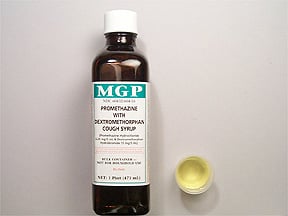
Promethazine-dm Coupons & Savings Card – Discount Prices from $7.38
Promethazine DM is a combination medication used to provide temporary relief from symptoms associated with allergies and the common cold, such as a runny nose, sneezing, and coughing. It is suitable for use in adults and children aged 2 years and older. The medication combines two active ingredients: promethazine and dextromethorphan. Promethazine acts as an antihistamine by blocking histamine, a natural substance that causes allergic reactions, and also has a drying effect to alleviate symptoms. Dextromethorphan is a cough suppressant that reduces the urge to cough by acting on the brain's cough center.
This medication is typically taken orally every 4 to 6 hours. It is important to note that Promethazine DM should not be used in children under 2 years old due to the risk of serious side effects. Additionally, it is not recommended for treating persistent coughs from smoking or chronic respiratory conditions unless directed by a healthcare professional.
Promethazine DM does not cure or shorten the duration of the common cold, and it may cause side effects such as drowsiness and stomach upset. Caution is advised, especially in children, and the dosage instructions should be followed carefully to minimize the risk of side effects. Avoid using other cough and cold medications that contain similar ingredients. For additional relief, consider non-medicinal methods like increasing fluid intake and using a humidifier. Always consult with a healthcare provider for advice tailored to your specific needs.
Our coupons are free to use. Before paying, show the pharmacist your Promethazine-dm savings card to get your free discount. Use our filters below to edit the prescription box to match your needs. The Promethazine-dm prices will update based on your prescription needs. Above our Promethazine-dm coupons, you can change your location to see pharmacy prices and costs in other areas. We're here to help you buy Promethazine-dm at the lowest price with our prescription discount card.
My prescription
Edit
118ML of 6.25-15MG/5ML, Promethazine-dm (1 Bottle)
Select pharmacy

CVS
$20.78
COUPON PRICE
Walmart
$7.38
COUPON PRICE
Walgreens
$8.67
COUPON PRICE
Albertsons
$10.16
COUPON PRICEPromethazine-dm savings card
Show this card to your pharmacist
Walmart
$7.38
BIN
ID
PCN
GRP
019876
LH2F353286
CHIPPO
LHX
Powered by
Promethazine DM is a combination medication used to provide temporary relief from symptoms associated with allergies and the common cold, such as a runny nose, sneezing, and coughing. It is suitable for use in adults and children aged 2 years and older. The medication combines two active ingredients: promethazine and dextromethorphan. Promethazine acts as an antihistamine by blocking histamine, a natural substance that causes allergic reactions, and also has a drying effect to alleviate symptoms. Dextromethorphan is a cough suppressant that reduces the urge to cough by acting on the brain's cough center.
This medication is typically taken orally every 4 to 6 hours. It is important to note that Promethazine DM should not be used in children under 2 years old due to the risk of serious side effects. Additionally, it is not recommended for treating persistent coughs from smoking or chronic respiratory conditions unless directed by a healthcare professional.
Promethazine DM does not cure or shorten the duration of the common cold, and it may cause side effects such as drowsiness and stomach upset. Caution is advised, especially in children, and the dosage instructions should be followed carefully to minimize the risk of side effects. Avoid using other cough and cold medications that contain similar ingredients. For additional relief, consider non-medicinal methods like increasing fluid intake and using a humidifier. Always consult with a healthcare provider for advice tailored to your specific needs.
Our coupons are free to use. Before paying, show the pharmacist your Promethazine-dm savings card to get your free discount. Use our filters below to edit the prescription box to match your needs. The Promethazine-dm prices will update based on your prescription needs. Above our Promethazine-dm coupons, you can change your location to see pharmacy prices and costs in other areas. We're here to help you buy Promethazine-dm at the lowest price with our prescription discount card.
Promethazine-dm dosage forms
Use our Promethazine-dm 118ML of 6.25-15MG/5ML coupon with prices from $7.38 for 1 Bottle. You can also use our Promethazine-dm 118ML of 6.25-15MG/5ML coupon with prices from $12.27 for 2 Bottles. We have a Promethazine-dm 118ML of 6.25-15MG/5ML coupon with prices from $17.15 for 3 Bottles.
Dosage Quantity Price from Per unit 118ML of 6.25-15MG/5ML 1 Bottle $7.38 $7.38 118ML of 6.25-15MG/5ML 2 Bottles $12.27 $6.13 118ML of 6.25-15MG/5ML 3 Bottles $17.15 $5.72
| Dosage | Quantity | Price from | Per unit |
|---|---|---|---|
| 118ML of 6.25-15MG/5ML | 1 Bottle | $7.38 | $7.38 |
| 118ML of 6.25-15MG/5ML | 2 Bottles | $12.27 | $6.13 |
| 118ML of 6.25-15MG/5ML | 3 Bottles | $17.15 | $5.72 |
